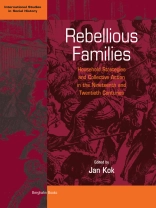Why do people rebel? This is one of the most important questions historians and social scientists have been grappling with over the years. It is a question to which no satisfactory answer has been found, despite more than a century of research. However, in most cases the research has focused on what people do if they rebel but hardly ever, why they rebel.
The essays in this volume offer an alternative perspective, based on the question at what point families decided to add collective action to their repertoires of survival strategies, In this way this volume opens up a promising new field of historical research: the intersection of labour and family history. The authors offer fascinating case studies in several countries spanning over four continents during the last two centuries. In an extensive introduction the relevant literature on households and collective action is discussed, and the volume is rounded off by a conclusion that provides methodological and theoretical suggestions for the further exploration of this new field in social history.
Содержание
List of Tables, Figures and Maps
Preface
Jan Kok
Chapter 1. Introduction
Marcel van der Linden
Chapter 2. Early British Labour Movements in Relation to Family Needs
Eileen Janes Yeo
Chapter 3. Weaving Survival in the Tapestry of Village Life. Strategies and Status in the Silesian Weaver Revolt of 1844
Christina von Hodenberg
Chapter 4. The Case of Clarinna Stringer: Strategic Options and the Household Economy in Late Nineteenth-Century Australia
Bruce Scates
Chapter 5. Family and Unionisation in the Bricklaying Trade in Turn-of-the-Century Madrid
Justin Byrne
Chapter 6. ‘Who Will Look after the Kiddies?’ Households and Collective Action during the Dublin Lockout, 1913
Theresa Moriarty
Chapter 7. Family Ties and Labour Activism among Silk Workers in Northeastern Pennsylvania, U.S.A., 1900–1920
Bonnie Stepenoff
Chapter 8. The Trade Union as Survival Strategy. The Case of Amsterdam Construction Workers in the First Quarter of the Twentieth Century
Henk Wals
Chapter 9. High-Cost Activism and the Worker Household: Interests, Commitment, and the Costs of Revolutionary Activism in a Philippine Plantation Region
Rosanne Rutten
Chapter 10. Retreat from Collective Protest: Household, Gender, Work and Popular Opposition in Stalinist Hungary
Mark Pittaway
Chapter 11. Conclusion
Marcel van der Linden
Notes on Contributors
Index
Об авторе
Jan Kok received his doctorate from the Free University of Amsterdam where he also taught history before moving to the International Institute of Social History where he combined studies in historical demography with work on a large database, the Historical Sample of the Netherlands. Since 1999 he has also been research director of the program ‘Household and Labour’ of the N.W. Posthumus Institute.












